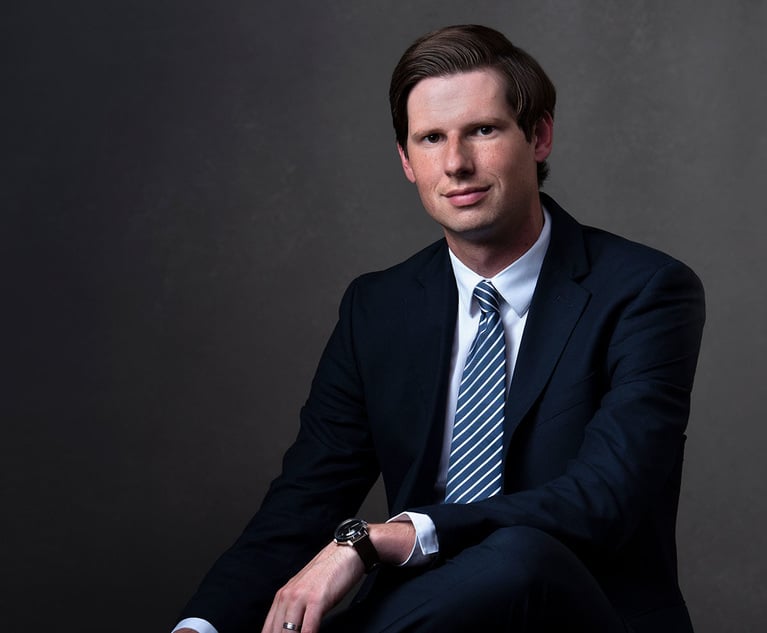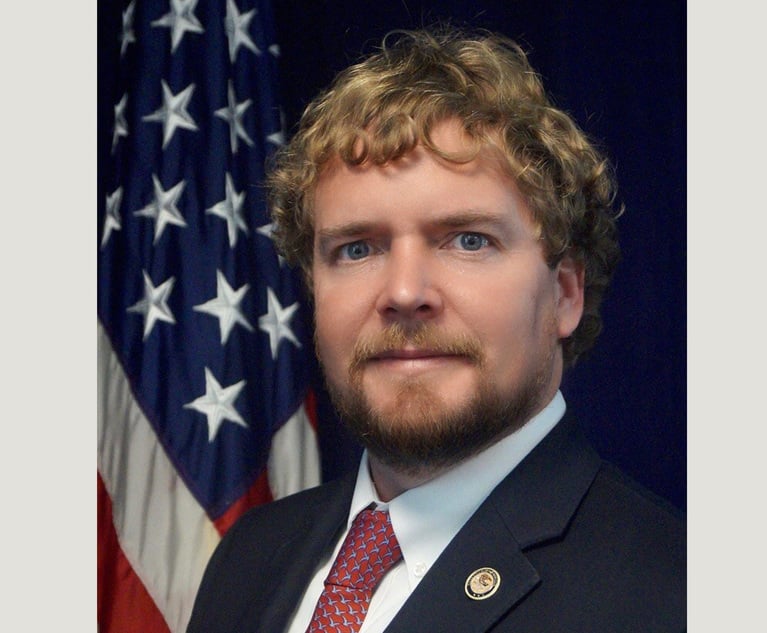Appeals Court Rules Against West Chester University Whistleblower
The U.S. Court of Appeals for the Third Circuit upheld the dismissal of Colleen M. Bradley's case against her former boss Mark Mixner, West Chester University, and the Pennsylvania State System of Higher Education.
January 26, 2018 at 02:14 PM
3 minute read
 Getty Images/iStockphoto
Getty Images/iStockphoto
A First Amendment case filed by a former financial officer at West Chester University, who claimed the school sacked her for blowing the whistle on allegedly dishonest budgeting practices, has once again failed.
The U.S. Court of Appeals for the Third Circuit upheld the dismissal of Colleen M. Bradley's case against her former boss Mark Mixner, West Chester University and the Pennsylvania State System of Higher Education.
Bradley sued West Chester, Mixner, the Pennsylvania State System of Higher Education (PASSHE) and other school officials, claiming her contract was not renewed in retaliation for speaking out against the school's budgeting practices.
Bradley claimed she was told by PASSHE officers and Mixner to change a multimillion-dollar surplus on the school's budget report to a multimillion-dollar deficit in order to get more taxpayer funding.
The defendants were granted immunity under the 11th Amendment by U.S. District Judge Michael Baylson of the Eastern District of Pennsylvania and dismissed from the case. Bradley appealed.
“We agree with the district court's holding on Eleventh Amendment immunity, and therefore uphold its dismissal of the claims against West Chester and the State System. We disagree with the district court's holding on the protected status of Ms. Bradley's speech, but because we hold that the speech was not constitutionally protected, we uphold its grant of summary judgment in favor of Mr. Mixner,” wrote Judge Matthew Brann, who is a U.S. district judge but is sitting by designation in the Third Circuit.
In his March 2017 opinion, Baylson wrote that when Bradley publicly called the alleged budgeting practice “unethical” at a budget committee meeting, she did so as a private citizen and not a university employee. Both factors needed to prevail for her First Amendment claims to survive.
But Baylson held that while Bradley's speech was protected, she failed to prove it was a factor in the university's decision not to renew her contract. Bradley, who was hired in 2011, allegedly started whistleblowing activities in September 2012. Her contract was not renewed when it elapsed in June 2015.
The circuit disagreed with Baylson's reasoning but upheld his ruling: “Because Ms. Bradley's speech was made as a government employee and not a citizen, she has failed to state a First Amendment claim. Therefore, we uphold the district court's grant of summary judgment in favor of Mr. Mixner on count I of her amended complaint.”
Glen Mills attorney Daniel Kearney, who represented Bradley, said, ”We're obviously very disappointed with the court's ruling and plan on seeking rehearing and reargument en banc.”
John Knorr III of the state Attorney General's Office defended Mixner and the university defendants. He did not respond to a request for comment.
This content has been archived. It is available through our partners, LexisNexis® and Bloomberg Law.
To view this content, please continue to their sites.
Not a Lexis Subscriber?
Subscribe Now
Not a Bloomberg Law Subscriber?
Subscribe Now
NOT FOR REPRINT
© 2025 ALM Global, LLC, All Rights Reserved. Request academic re-use from www.copyright.com. All other uses, submit a request to [email protected]. For more information visit Asset & Logo Licensing.
You Might Like
View All

Superior Court Directs Western Pa. Judge to Recuse From Case Over Business Ties to Defendant
3 minute read

Trending Stories
- 1Decision of the Day: Judge Dismisses Defamation Suit by New York Philharmonic Oboist Accused of Sexual Misconduct
- 2California Court Denies Apple's Motion to Strike Allegations in Gender Bias Class Action
- 3US DOJ Threatens to Prosecute Local Officials Who Don't Aid Immigration Enforcement
- 4Kirkland Is Entering a New Market. Will Its Rates Get a Warm Welcome?
- 5African Law Firm Investigated Over ‘AI-Generated’ Case References
Who Got The Work
J. Brugh Lower of Gibbons has entered an appearance for industrial equipment supplier Devco Corporation in a pending trademark infringement lawsuit. The suit, accusing the defendant of selling knock-off Graco products, was filed Dec. 18 in New Jersey District Court by Rivkin Radler on behalf of Graco Inc. and Graco Minnesota. The case, assigned to U.S. District Judge Zahid N. Quraishi, is 3:24-cv-11294, Graco Inc. et al v. Devco Corporation.
Who Got The Work
Rebecca Maller-Stein and Kent A. Yalowitz of Arnold & Porter Kaye Scholer have entered their appearances for Hanaco Venture Capital and its executives, Lior Prosor and David Frankel, in a pending securities lawsuit. The action, filed on Dec. 24 in New York Southern District Court by Zell, Aron & Co. on behalf of Goldeneye Advisors, accuses the defendants of negligently and fraudulently managing the plaintiff's $1 million investment. The case, assigned to U.S. District Judge Vernon S. Broderick, is 1:24-cv-09918, Goldeneye Advisors, LLC v. Hanaco Venture Capital, Ltd. et al.
Who Got The Work
Attorneys from A&O Shearman has stepped in as defense counsel for Toronto-Dominion Bank and other defendants in a pending securities class action. The suit, filed Dec. 11 in New York Southern District Court by Bleichmar Fonti & Auld, accuses the defendants of concealing the bank's 'pervasive' deficiencies in regards to its compliance with the Bank Secrecy Act and the quality of its anti-money laundering controls. The case, assigned to U.S. District Judge Arun Subramanian, is 1:24-cv-09445, Gonzalez v. The Toronto-Dominion Bank et al.
Who Got The Work
Crown Castle International, a Pennsylvania company providing shared communications infrastructure, has turned to Luke D. Wolf of Gordon Rees Scully Mansukhani to fend off a pending breach-of-contract lawsuit. The court action, filed Nov. 25 in Michigan Eastern District Court by Hooper Hathaway PC on behalf of The Town Residences LLC, accuses Crown Castle of failing to transfer approximately $30,000 in utility payments from T-Mobile in breach of a roof-top lease and assignment agreement. The case, assigned to U.S. District Judge Susan K. Declercq, is 2:24-cv-13131, The Town Residences LLC v. T-Mobile US, Inc. et al.
Who Got The Work
Wilfred P. Coronato and Daniel M. Schwartz of McCarter & English have stepped in as defense counsel to Electrolux Home Products Inc. in a pending product liability lawsuit. The court action, filed Nov. 26 in New York Eastern District Court by Poulos Lopiccolo PC and Nagel Rice LLP on behalf of David Stern, alleges that the defendant's refrigerators’ drawers and shelving repeatedly break and fall apart within months after purchase. The case, assigned to U.S. District Judge Joan M. Azrack, is 2:24-cv-08204, Stern v. Electrolux Home Products, Inc.
Featured Firms
Law Offices of Gary Martin Hays & Associates, P.C.
(470) 294-1674
Law Offices of Mark E. Salomone
(857) 444-6468
Smith & Hassler
(713) 739-1250





